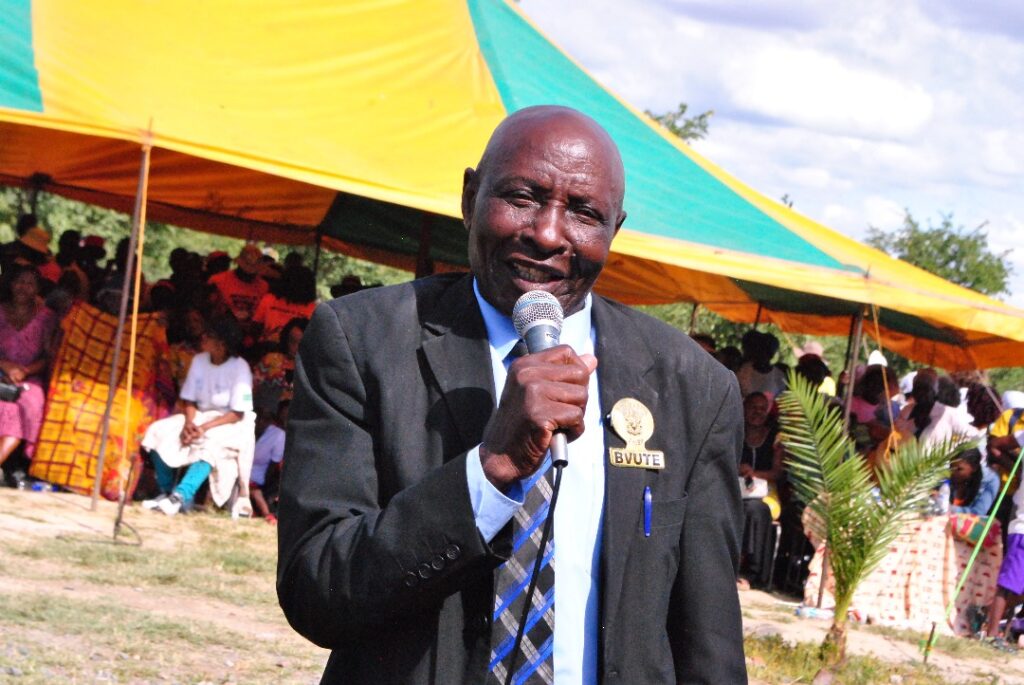Of Chief Bvute ‘ s Steadfast Allegiance to Zanu PF and the Shadows of Press Freedom.
By Dumisani Ndlovu
In Mberengwa, a village where the whispers of ancestors linger in the wind and the rhythm of life is steeped in rich tradition, an air of anticipation enveloped the gathering at Neta High School. It was a day marked for the Provincial Women’s Day commemoration, yet the palpable excitement was intertwined with a deeper undercurrent of trepidation. Chief Andrew Bvute, a man of both history and authority, stood poised to address the crowd. Dressed in traditional garb that spoke of lineage and cultural heritage, he embodied the essence of a chief—both revered and feared.
As the sun dipped low in the sky, bathing the assembly in a warm, golden hue, Chief Bvute stepped forward to the podium. His deep baritone voice resonated through the crowd, captivating the audience not merely as a traditional leader but as an unwavering supporter of the ruling ZANU PF party.
“Some of you may wonder, why the chief is sloganeering,” he began, his words weaving a complex needlepoint of pride and resignation.“I have always been this way, long before I became a chief. I know no other party and will never join any other.”
His endorsement of the ED 2030 resolution—a political maneuver to extend President Emmerson Mnangagwa’s tenure—sent ripples through the audience. Cheers erupted, but they were tinged with hesitation, a reflection of the unspoken agreement to conform to political tides even as dissent brewed within.The chief’s words carried the weight of tradition, yet hinted at a foreboding future—a chilling reminder of the intricate dance between loyalty and fear that defined Zimbabwe’s political landscape.
Chief Bvute’s position afforded him significant influence, yet it was a double-edged sword, binding him to the expectations of political elites while constraining his autonomy. His allegiance to ZANU PF illustrated the complex interplay between tradition and modernity, authority and freedom. The chief’s public endorsement was not merely a political statement; it was a declaration of fealty in scenery where the rule of law often buckled beneath the weight of political machinations.
The chief’s tone took a menacing turn, casting a chill over the gathering. He approached the journalist, who had been tasked with covering the event, his demeanor suddenly dark and intimidating. “You will write a favorable report,” he warned his voice low and menacing. “If you don’t, I’ll make sure you face consequences.” The veiled threat hung in the air, leaving the journalist unsettled.
The journalist, acutely aware of the stakes, stood firm.His refusal to comply with the intimidation echoed a courageous act of resilience amidst a culture of fear. The confrontation illuminated the precarious nature of press freedom in Zimbabwe, a right theoretically enshrined in the Constitution but practically undermined by those sworn to protect it. Chief Bvute’s attempted coercion reflected a broader societal pattern of censorship, where dissenting voices were stifled beneath the weight of authority.
As the gathering resumed its celebratory facade, the echoes of the chief’s threats lingered ominously in the air.The incident served as a harsh reminder of the ever-looming shadows of intimidation, casting doubt on the viability of dissent in a society dominated by fear. The ED 2030 resolution gained traction within ZANU PF, and as factions within the party clamored for continuity, the implications for leadership stability stirred fervent debate across the nation.
Yet, amid the political maneuvering, a quiet defiance began to take root in the hearts of ordinary citizens. Their whispers spoke of a yearning for change, for a leadership that prioritized the welfare of the populace over the ambitions of a select few. This resolve served as a counterpoint to the intimidation tactics employed by figures like Chief Bvute, a testament to the enduring spirit of those who aspired for a more democratic and just society.
In the days that followed, the narrative surrounding the ED 2030 resolution intertwined with the stories of those who dared to challenge the status quo.The journalist, undeterred by threats, poured his heart into documenting the struggles and aspirations of Mberengwa’s people. His articles became a beacon of hope, illuminating a path toward a future where press freedom and citizens’ rights would be safeguarded against encroaching tyranny.
As the nation grappled with the implications of Chief Bvute’s endorsement, it became evident that the fight for press freedom and the rights of citizens in Zimbabwe was far from over.The chief’s actions, while emblematic of the challenges ahead, also catalyzed change—a reminder that the voices of the many would ultimately rise above the threats of the few.
The atmosphere grew tenser as the gathering dispersed.Two Gweru opposition CCC party councillors, Faith Rutendo Chuma from Ward 2 and Nyaradzo Madzikura from Ward 9, had mysteriously disappeared amidst the chaos of the event, leaving behind questions of their safety and the implications of dissent in a politically charged environment. Their absence resonated with the community—a chilling reminder of the risks faced by those who dared to oppose the ruling party.
In Mberengwa, where tradition and politics intertwined, the struggle for a brighter future continued. The sun set on that fateful day, casting long shadows that symbolized both the weight of tradition and the fight for freedom.The resilient spirit of the Zimbabwean people glimmered beneath the surface, waiting for the right moment to rise against the tides of oppression.
As the echoes of Chief Bvute’s allegiance to ZANU PF reverberated through the village, the shadows of intimidation began to recede, giving way to the dawn of a new era—a testament to resilience, courage, and the unyielding belief that every voice matters. In Mberengwa, amidst the complexities of tradition and modernity, the pursuit of truth would never be silenced, and the spirit of defiance would forever illuminate the path to justice and freedom.

Mberengwa’s Chief Andrew Bvute enters the political fray

